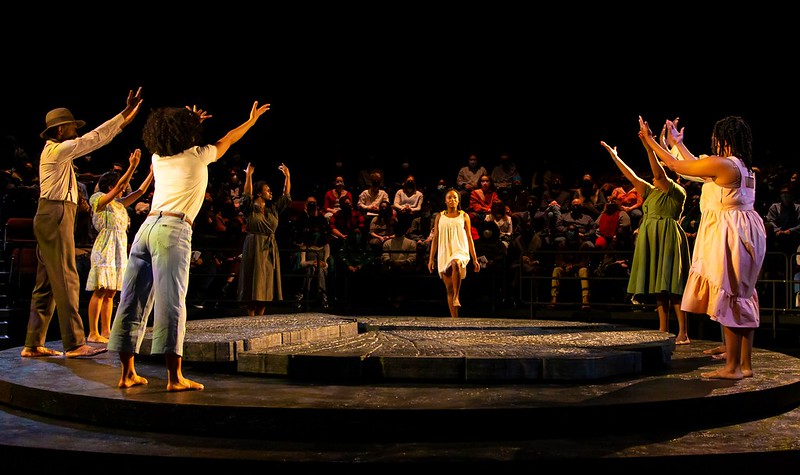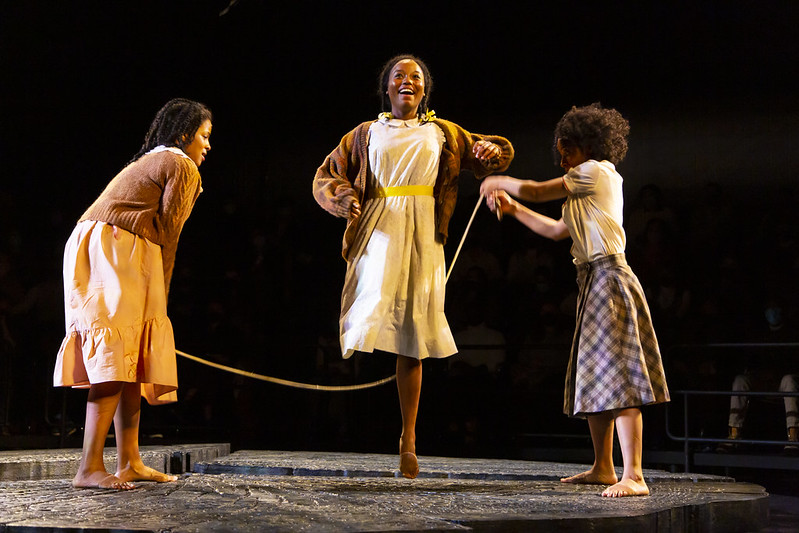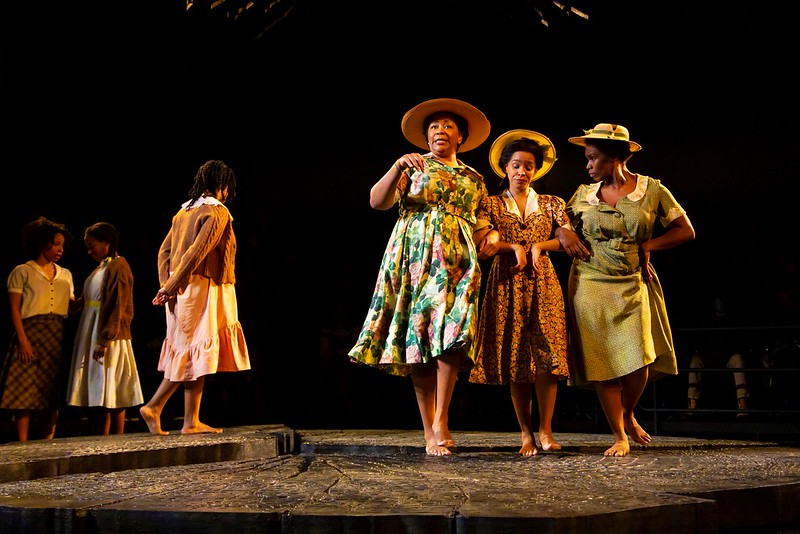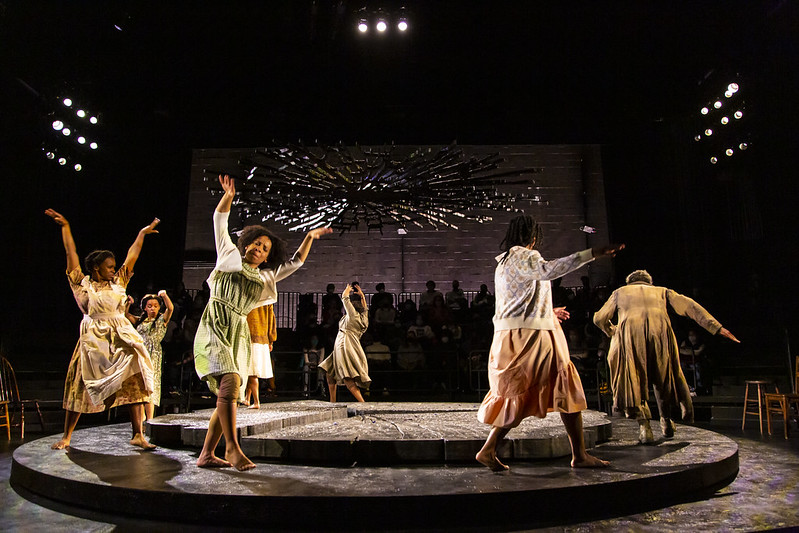
by Shelley A. Sackett
‘The Bluest Eye’ – Based on the book by Toni Morrison, adapted for stage by Lydia R. Diamond, Dramaturgy by Sandy Alexandre. Directed by Awoye Timpo; Set Design by Jason Ardizzone-West; Costume Design by Dede Ayite and Rodrigo Muñoz; Lighting Design by Adam Honoré; Sound Design by Aubrey Dube; Original Music by Justin Ellington; Choreography by Kurt Douglas; Music Direction by David Freeman Coleman. Presented by Huntington Theatre Company at Boston Center for the Arts through March 26. Digital recordings available Feb. 14 through April 9.
Brimming with sparkling ensemble acting, inspired staging and soulful song and dance, Huntington Theatre’s The Bluest Eye packs a wallop. Thanks to Lydia R. Diamond’s faithful yet nuanced adaptation, Toni Morrison’s groundbreaking début novel about two poor Black families in 1940s Lorain, Ohio is brought to the stage with all its poetry, pathos and humor intact. You can almost feel Morrison’s presence in the audience, beaming pride and approval.
The story is neither easy nor pretty. Nor is it sugar-coated. A harrowing (and timely) tale about the insidious effects of racism, the 80-minute intermission-less play explores what happens to people — especially children — whose identities and self-images become distorted by the relentless oppression and cruelty they suffer.
What happens to that marginalized little Black girl who feels neglected, lonely and ugly? Whose hand local (white) shopkeepers won’t touch? Whose home life is abusive and unsafe? Whose only frame of reference for happiness, friendship and family harmony is the Dick and Jane primer she reads every day in school, the one about white, blue-eyed, blond Jane and her adoring, white parents?

From the get go, there is a feeling of community and engagement among the actors and between actors and audience. Performed on a raised, round stage between two semi-circles of audience members, the (masked) physical immediacy and intimacy heightens the mood. No one is hidden; no one can hide.
The play opens with two feisty preteen sisters discussing local gossip. Claudia (Brittany-Laurelle, who brings a powerful but contained individuality to the role) and Frieda (Alexandria King in a magnificently physical and expressive, punchy performance) will act as narrators and guides, and their sassy, lighthearted banter is the perfect foil to the heaviness of the story that will unfold. Like vocal choreography, their voices dance with and around each other, weaving a single tapestry from many strands.
Their main topic of conversation is the Breedlove family, the ugliest family in Lorain. “Their ugliness came from a conviction that they accepted without question,” Claudia explains. Eleven-year-old Pecola Breedlove (played by the hypnotic Hadar Busia-Singleton, who manages to infuse her unbearably sad character with a whisper of hope) knows the world finds her Blackness ugly. “How do you get somebody to love you?” she asks over and over.
But she has a plan. She has figured out the key to being lovable. All she needs are blue eyes, as blue as Jane’s and Shirley Temple’s. “Then the teachers would see me and people would have to be nice to me,” she explains matter-of-factly.

Claudia and Frieda’s recollections and narrations are the backbone of the play, told with overlying reenactments of the various scenarios that have shaped and marked their and Pecola’s families. Mrs. Breedlove (McKenzie Frye) is a cleaning woman with a bum foot and missing front tooth who would go to the movies and dream of looking like Jean Harlow. Her husband Cholly (Greg Alverez Reid) suffered the kind of loss, humiliation and violence that doesn’t excuse his inexcusable acts, but at least provides context. Beneath their toughened exteriors, each carries the weight of unbearable despair. Together, they are a ticking time bomb, Pecola its collateral damage.
By comparison, Claudia, Frieda and their Mama (played by Ramona Lisa Alexander as unyielding and fussy yet kindhearted) lead a life of relative ease and stability. These three are the source of the play’s lightness and humor. As Claudia, Brittany-Laurelle brings down the house in the reenactment of a scene when she received a blond, white baby doll as a gift. To her mother’s disbelief and horror, rather than covet it, she destroys it, but only after she has humiliated and terrorized it. She hates its so-called beauty. “What was I supposed to do with that?” she asks without irony.

Through a series of events that would include spoilers, Pecola’s prayers for blue eyes and all that means seem to be answered by the magic of Soaphead Church, a charlatan soothsayer, played brilliantly by Brian D. Coats. Yet, it is at such a steep price that we are left grieving for this child whose innocent light has been extinguished.
Under Awoye Timpo’s direction, The Bluest Eye brings a lot of extras to the table. She makes wonderful use of a trio of women who appear throughout the production, imbuing them with many of the gestures and props familiar to fans of Alvin Ailey’s “Revelations.” They are welcome palette cleansers, acting as part Greek chorus, part harpies, and part goddesses. The interweaving of a capella spirituals (Frye is a knockout) and choreography (especially the slow-motion battle scene between Cholly and Mrs. Breedlove) is inspired and welcome.
The Boston theater scene is replete with many productions that are well worth seeing. Only a handful rise to the level of “must see.” The Bluest Eye is one of them. For tickets and information, go to: https://www.huntingtontheatre.org/

